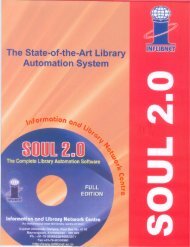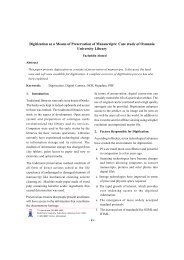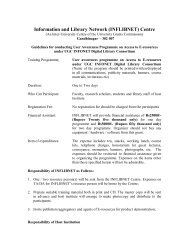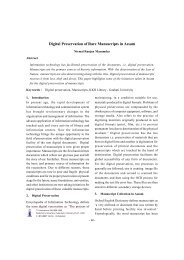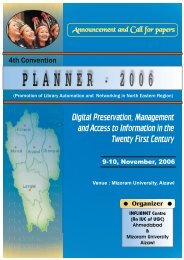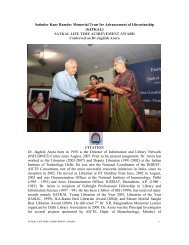Panjab University - INFLIBNET Centre
Panjab University - INFLIBNET Centre
Panjab University - INFLIBNET Centre
Create successful ePaper yourself
Turn your PDF publications into a flip-book with our unique Google optimized e-Paper software.
66 M.A. POLITICAL SCIENCE (SEMESTER SYSTEM) SYLLABUSThe syllabus has been divided into four units.There shall be 9 questions in all. The first question is compulsory and shall be short answer typecontaining 15 short questions spread over the whole syllabus to be answered in about 25 to 30 words each.The candidates are required to attempt any 10 short answer type questions carrying 20 marks i.e. 2 marksfor each. Rest of the paper shall contain 4 units. Each unit shall have two questions, and the candidatesshall be given internal choice of attempting one question from each Unit – 4 in all. Each question will carry15 marks.Objectives: This paper aims at highlighting some of the major areas in the domain of political sociologywith reference to India. The paper intends to familiarize the students with the social, cultural and economicstructures of power in the Indian society and their mechanism of functioning in a critical perspective.Unit I : Political Sociology : Thematic Concerns :.1. Nature, meaning and scope.2. Historical Development.Unit II : Social Stratification :1. Concepts and Theoretical Contexts (Marx, Dahrendorf, Weber, and L. Dumont).2. Caste, Class and Power.Unit III : Conflict Formation :1. Theoretical dimensions (Simmel, Coser, Marx and Dahrendorf).2. Caste and Communal conflicts.Unit IV : Political Sociology of Agrarian Relations :1. Zamindari Abolition and Land Reforms.2. Pressure Groups : Farmers and Labourers.Books Recommended :1. Effrat, Andrew, Perspective on Political Sociology, New York, The Bobbs-Merrill, 1972.2. Dowse, Robert E. & Hughes, John A., Political Sociology, London, John Wiley, 1975.3. Horowitz, Foundations of Political Sociology, New York, Harper & Row, 1972.4. Das, Hari Hara and Choudhary, B.C., Introduction to Sociology, New Delhi, Vikas, 1997.5. Tumin, M.M., Social Stratification, New Jersey, Prentice Hall, 1978.6. Gupta, Dipankar (ed.), Social Stratification, Delhi, OUP, 1991.7. Scott, John, Stratification and Power, Cambridge, Polity, 1996.8. Sharma, K.L., Social Stratification in India, New Delhi, Sage, 1997.9. Singh, Yogendra, Social Change in India, New Delhi, Har Anand, 1993.10. Layder, Derek, Understanding Social Theory, London, Sage, 1996.11. Jaiswal, Suvira, Caste : Origin, Function and Dimensions of Change, Delhi, Manohar, 1998.12. Srinivas, M.N., Social Change in Modern India, New Delhi, 1969.13. Runciman, W.S., Social Science and Political Theory, Cambridge, 1971.14. Lukes, Steven, Power : A Radical View, Hong Kong, Macmillan, 1974.15. Barnes, Barry, The Nature of Power, Cambridge, Polity, 1988.


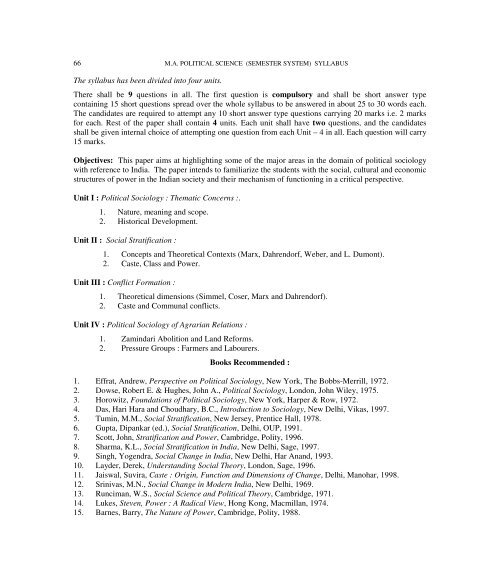
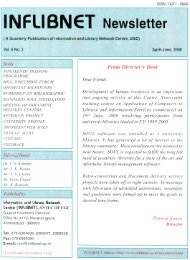


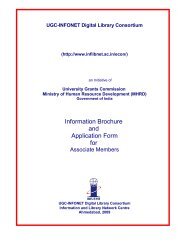
![Uni of Delhi_MA_History[1]. - INFLIBNET Centre](https://img.yumpu.com/48586372/1/190x245/uni-of-delhi-ma-history1-inflibnet-centre.jpg?quality=85)
